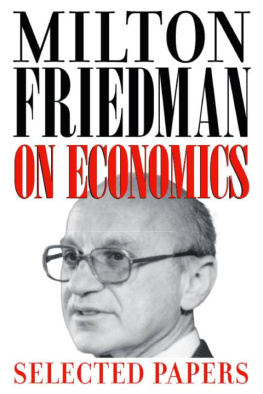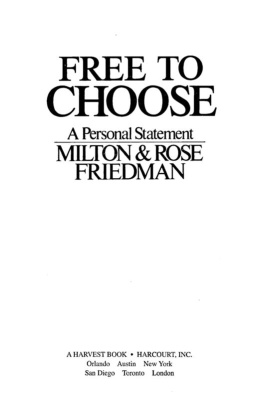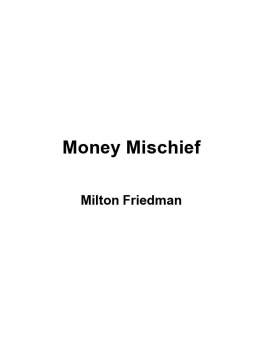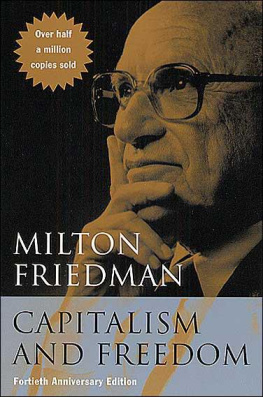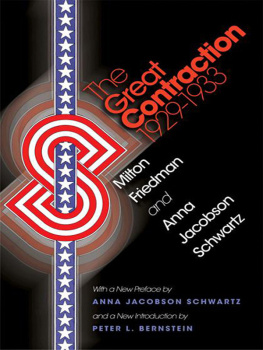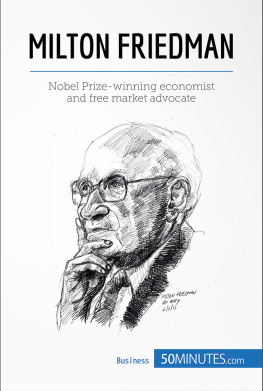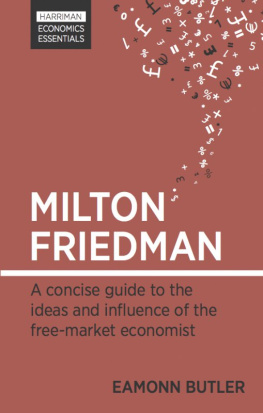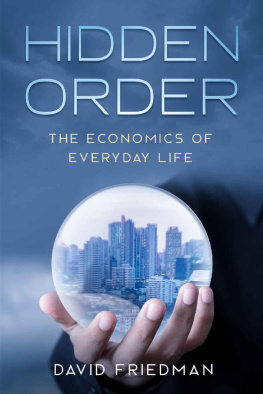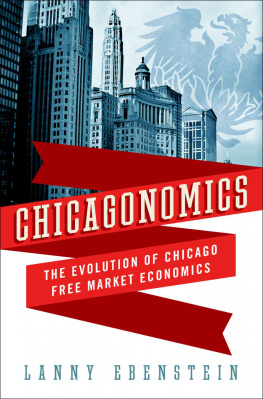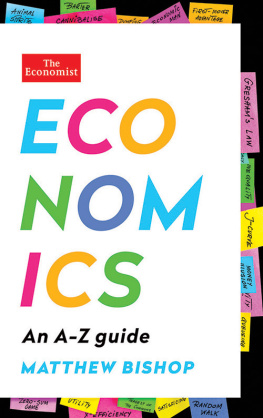WITH AN AFTERWORD BY GARY S. BECKER



Milton Friedman
The Journal of Political Economy, Vol. 85, No. 3 (Jun., 1977), pp. 451-472
Milton Friedman and L. J Savage
The Journal of Political Economy, Vol. 56, No. 4 (Aug., 1948), pp. 279-304
Milton Friedman and L. J. Savage
The Journal of Political Economy, Vol. 60, No. 6 (Dec., 1952), pp. 463-474
Milton Friedman and Gary S. Becker
The Journal of Political Economy, Vol. 65, No. 1 (Feb., 1957), pp. 64-75
Milton Friedman
The Journal of Political Economy, Vol. 67, No. 4 (Aug., 1959), pp. 327-351
Milton Friedman
The Journal of Law and Economics, Vol. 9 (Oct., 1966), pp. 7185
Milton Friedman
The Journal of Political Economy, Vol. 79, No. 4 (Aug., 1948), pp. 846-856
Milton Friedman
The Journal of Political Economy, Vol. 98, No. 6 (Dec., 1990), pp. 1159-1194
Gary S. Becker
I am much indebted for helpful comments on the first draft of this paper to Gary Becker, Karl Brunner, Phillip Cagan, Robert Gordon, Arnold Harberger, Harry G. Johnson, S. Y. Lee, James Lothian, Robert E. Lucas, David Meiselman, Allan Meltzer, Jose Scheink- man, Theodore W. Schultz, Anna J. Schwartz, Larry Sjaastad, George J. Stigler, Sven-Ivan Sundqvist, and the participants in the Money and Banking Workshop of the University of Chicago. I am deeply indebted also to my wife, Rose Director Friedman, who took part in every stage of the preparation of the paper, and to my secretarial assistant, Gloria Valentine, for performance above and beyond the call of duty.
When the Bank of Sweden established the prize for economic science in memory of Alfred Nobel in 1968, there doubtless was-as there doubtless still remains-widespread skepticism among both scientists and the broader public about the appropriateness of treating economics as parallel to physics, chemistry, and medicine. These are regarded as "exact sciences" in which objective, cumulative, definitive knowledge is possible. Economics and its fellow social sciences are regarded more nearly as branches of philosophy than of science properly defined, enmeshed with values at the outset because they deal with human behavior. Do not the social sciences, in which scholars are analyzing the behavior of themselves and their fellowmen, who are in turn observing and reacting to what the scholars say, require fundamentally different methods of investigation than the physical and biological sciences? Should they not be judged by different criteria?
1. Social and Natural Sciences
I have never myself accepted this view. I believe that it reflects a misunderstanding not so much of the character and possibilities of social science as of the character and possibilities of natural science. In both, there is no "certain" substantive knowledge; only tentative hypotheses that can never be "proved" but can only fail to be rejected, hypotheses in which we may have more or less confidence, depending on such features as the breadth of experience they encompass relative to their own complexity and relative to alternative hypotheses, and the number of occasions on which they have escaped possible rejection. In both social and natural sciences, the body of positive knowledge grows by the failure of a tentative hypothesis to predict phenomena that the hypothesis professes to explain; by the patching up of that hypothesis until someone suggests a new hypothesis that more elegantly or simply embodies the troublesome phenomena, and so on ad infinitum. In both, experiment is sometimes possible, sometimes not (witness meteorology). In both, no experiment is ever completely controlled, and experience often offers evidence that is the equivalent of controlled experiment. In both, there is no way to have a self-contained closed system or to avoid interaction between the observer and the observed. The Godel theorem in mathematics, the Heisenberg uncertainty principle in physics, the self-fulfilling or self-defeating prophecy in the social sciences all exemplify these limitations.
Of course, the different sciences deal with different subject matter, have different bodies of evidence to draw on (for example, introspection is a more important source of evidence for social than for natural sciences), find different techniques of analysis most useful, and have achieved differential success in predicting the phenomena they are studying. But such differences are as great among, say, physics, biology, medicine, and meteorology as between any of them and economics.
Even the difficult problem of separating value judgments from scientific judgments is not unique to the social sciences. I well recall a dinner at a Cambridge University college when I was sitting between a fellow economist and R. A. Fisher, the great mathematical statistician and geneticist. My fellow economist told me about a student he had been tutoring on labor economics, who, in connection with an analysis of the effect of trade unions, remarked, "Well surely, Mr. X (another economist of a different political persuasion) would not agree with that." My colleague regarded this experience as a terrible indictment of economics because it illustrated the impossibility of a value-free positive economic science. I turned to Sir Ronald and asked whether such an experience was indeed unique to social science. His answer was an impassioned no, and he proceeded to tell one story after another about how accurately he could infer views in genetics from political views.
One of my great teachers, Wesley C. Mitchell, impressed on me the basic reason why scholars have every incentive to pursue a value-free science, whatever their values and however strongly they may wish to spread and promote them. In order to recommend a course of action to achieve an objective, we must first know whether that course of action will in fact promote the objective. Positive scientific knowledge that enables us to predict the consequences of a possible course of action is clearly a prerequisite for the normative judgment whether that course of action is desirable. The Road to Hell is paved with good intentions, precisely because of the neglect of this rather obvious point.

